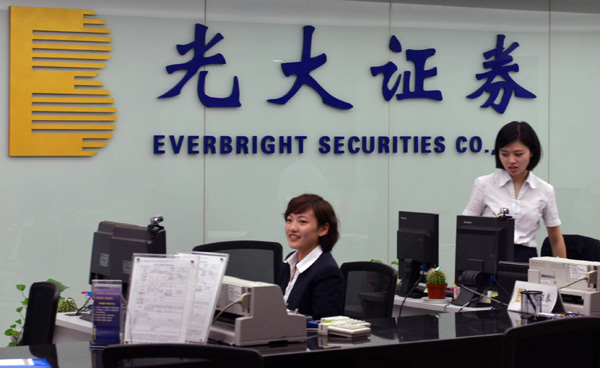Glitch rings regulator's alarm bell
 0 Comment(s)
0 Comment(s) Print
Print E-mail China Daily, August 20, 2013
E-mail China Daily, August 20, 2013
|
|
|
A "fat finger" trading incident involving more than 7.2 billion yuan ($1.17 billion) at Everbright Securities Co Ltd on Friday exposed regulatory flaws and weak links in the workings of the nation's capital markets. Regulators are still investigating the trading error. [China Daily] |
The 7.2 billion yuan ($1.17 billion) mishap of Everbright Securities Co Ltd last Friday has not only left behind a host of trade-related problems but also raised issues that point to the inadequacies in the capital market mechanism and regulatory framework.
Everbright Securities, one of the largest securities brokerages by assets in China and controlled by State-owned financial conglomerate China Everbright Group, said in a filing to the Shanghai Stock Exchange on Sunday that the error occurred within the company's arbitrage-trading system. The original transaction volume was set at 80 million yuan, but a system error caused an unexpected increase in buying orders.
The debacle "has exposed the lack of a comprehensive warning mechanism in the stock exchanges," said Yin Zhongli, deputy director of the Institute of Finance and Banking at the Chinese Academy of Social Sciences.
An effective mechanism would have sounded the warning to traders when an unusually large order was placed, he said.
However, the stock exchange did not respond after Everbright Securities placed 23.4 billion yuan in buying orders on Friday, which was obviously unusual, he added.
Ye Tan, a financial columnist based in Shanghai, said in her blog: "It is unbelievable that such high-value trade can be conducted so smoothly after a serious mistake happened to a brokerage's internal system. Risk control within the stock exchange system is totally inadequate. I strongly fear a more terrible mistake may happen if no measures are taken."
What's more, after a senior executive at Everbright Securities openly denied there were any mishaps at lunch time, Everbright Securities went ahead selling 1.85 billion yuan in exchange-traded funds and, at the same time, sold 7,130 index futures contracts. Market sources estimated that this short-selling had grossed the company at least 100 million yuan as the index plunged after Everbright Securities eventually admitted the mistake at 2:25 pm.
"Clearly small investors buying blue chips without knowing the entire insider information became the biggest victims, while mature institutions and investors profiteer by taking advantage of the situation," she added.
Yang Guoying, a researcher with China Finance Thinktank, said the incident has "eroded investor confidence", which has already been "hit severely" by rumors about insider trading, financial fraud and price manipulation.
Media reports said Everbright Securities' "fat finger" incident touched off a 53 percent surge in trade volume on Friday morning, with tens of billion of yuan bought in as the index was pushed higher.
"Some institutions with big capital, such as Huijin (Central Huijin Investment Ltd), have been intervening in the stock market from time to time. The supervision authority lacks binding power over these activities," said Yin.
A sudden surge in the stock market is naturally linked with the "government supporting the market", leading to buying activities from small investors, he said.
Central Huijin, an investment arm of China's sovereign-wealth fund, has been constantly increasing its holdings of blue chips. It has been taken as a positive attitude from the central government that it will support the stock market, which stimulates investors, but analysts said the effects are diminished because of the prolonged poor performance of many listed State-owned companies.
On the other hand, what happened on Friday also triggered questioning into the aggressive expansion of China's financial institutions.
"As more financial institutions are using advanced technology to compete in the market, new trading methods and tools are replacing traditional ways, creating greater volatility," said Zhang Yun, a futures trader based in Shanghai.
Some analysts said many investment houses and stockbrokerages are seen to be compromising risk control in favor of speed and efficiency in making trades. The Everbright Securities case could make the authorities think twice before granting approvals to future applications for quantitative trading business and other innovations in the future
Everbright Securities said Shanghai securities authorities had told them to suspend trading of proprietary stocks in the spot market for three months until Nov 18.
The China Financial Futures Exchange on Sunday imposed restrictions on Everbright Securities, limiting its ability to establish fresh stock index futures.
Everbright clients are complaining the mistake made by Everbright will come at their expense. Others, especially short sellers, are charging Everbright for their losses on Friday.
China Southern Asset Management and SWS MU Fund Management both corrected the valuation of Everbright Securities to 10.22 yuan per share, down from 12.12 yuan at the close of trading on Friday.
Everbright Securities shares are suspended from trading in Shanghai until Tuesday.
The China Securities Regulatory Commission said it had launched a formal investigation into the problems at Everbright Securities, which could lead to "severe punishment", depending on the results.







Go to Forum >>0 Comment(s)